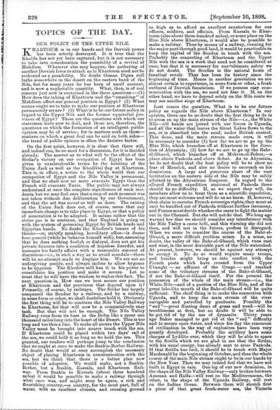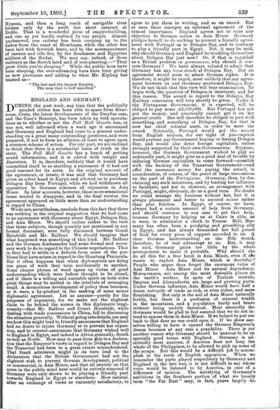TOPICS OF THE DAY
•
OUR POLICY ON THE UPPER NILE.
ICHARTOUM is in our hands and the Dervish power has been utterly destroyed. It is true that the Khalifa has not yet been captured, but it is not necessary to take into consideration the possibility of a revival of Mahdism. Whatever else may happen, the gathering of another Dervish force to attack us in Khartoum need not be reckoned as a possibility. No doubt Osman Digna still lurks somewhere in the desert on the eastern bank of the Nile, but for many years he has been of small account, and is now a neglectable quantity. What, then, is of real concern just now is contained in the three questions :—(1) How does the taking of Khartoum and the " smashing " of Mahdism affect our general position in Egypt ? (2) What means ought we to take to make our position at Khartoum permanently secure ? (3) What is to be our future policy in regard to the Upper Nile and the former equatorial pro- vinces of Egypt ? These are the questions with which our statesmen have now to deal, and these are, therefore, the questions on which the formation of an intelligent public opinion may be of service ; for in matters such as these— matters on which a great deal can be said on both sides— the trend of public opinion is often the decisive factor.
On the first point, however, it is clear that there will, and indeed can, be no need for a discussion, for it is decided already. The answer as to what will be the effect of the Sirdar's victory on our occupation of Egypt has been given in unmistakeable terms by the hoisting of the Union Jack as well as the Khedivial flag at Khartoum. This is, in effect, a notice to the whole world that our occupation of Egypt and the Nile Valley is permanent, and that we shall now no more evacuate Egypt than the French will evacuate Tunis. The public may not always understand at once the complete significance of such inci- dents, but we may feel sure that a step of such moment was not taken without due deliberation by our Government, and that the act was meant as well as done. The raising of the Union Jack does not, of course, mean that any immediate change is to take place in Egypt, or that a policy of annexation is to be adopted. It means rather that the status quo is to continue, and that England is going on with the system of governing Egypt by British heads and Egyptian hands. No doubt the Khedive's tenure of his throne—or, strictly speaking, hereditary office—is dumse bene gesserit (while he behaves himself well), but, assuming that he does nothing foolish or disloyal, does not get his private finances into a condition of hopeless disorder, and manages his family affairs with a reasonable amount of discretion—i.e., in such a way as to avoid scandals—there will be no attempt made to displace him. We are not an unforgiving people, and always incline to allow bygones to be bygones. The Khedive still has it in his power to consolidate his position and make it secure. Let us trust that he will have the wisdom to realise this fact. The next question is, How can we best secure our position at Khartoum and the provinces that depend upon it? Primarily, of course, by railways. The Sirdar has largely conquered the Soudan by a railway, and by a railway, in some form or other, we shall doubtless hold it. Obviously the first thing will be to continue the Nile Valley Railway to Khartoum, for that will now be a comparatively easy task. But that will not be enough. The Nile Valley Railway runs from its base in the Delta like a spear one thousand miles long into the heart of the Desert. This is too long and too thin a line. To make all secure the Upper Nile Valley must be brought into nearer touch with the sea. If Khartoum could be placed within two days' rail of the sea, we could hold it as long as we hold the sea. This granted, our readers will perhaps jump to the conclusion that we ought at once to make the Suakin-Berber Railway. No doubt that would at once accomplish the necessary object of placing Khartoum in communication with the sea, but we think that there is a better plan now possible of adoption. We would make, not a Suakin- Berber, but a Suakin, Kassala, and Khartoum Rail- way. From Suakin to Kassala (about three hundred miles) it would be possible to make a railway through what once was, and might soon be again, a rich and flourishing country,—a country, for the most part, full of water, with an excellent climate, and crossing ground so high as to afford an excellent sanatorium for our officers, soldiers, and officials. From -Kassala to Khar- toum (also about three hundred miles), or some place on the Blue Nile above Khartoum, it would also be possible to make a railway. Thus by means of a railway, running for the major part through good land, it would be practicable to keep the capital of the Soudan in touch with the sea. Probably the connecting of Khartoum and the Upper Nile with the sea is a work that need not be considered at once, but that it is necessary for ourrultimate safety we do not doubt. The Soudan is the natural home of fanatical revolt. That has been its history since the beginning of time. Hence in another generation we are almost certain to experience, in some form or other, a fresh outburst of Dervish fanaticism. If we possess easy com- munication with the sea, we need not fear it. If, on the other hand, we have to depend solely on the Nile route we may see another siege of Khartoum.
Last comes the question, What is to be our future policy as regards the Nile above Khartoum ? In our opinion, there can be no doubt that the first thing to do is to press on up the main stream of the Nile—i.e., the White Nile—till hands are joined with our forces in Uganda, and all the water that leaves the Great Lakes flows to the sea, or is absorbed into the sand, under British control. This done, and the main stream made ours, it will be necessary to consider (1) how far we are to go up the Blue Nile, which branches off at Khartoum in the direc- tion of Abyssinia ; (2) how far we are to go up the Bahr- el-Ghazel, which branches off at Mokren-el-Bohur,—a place above Fashoda and above Sobat. As to Abyssinia, we do not doubt that the best policy will be to show no, fear of Menelck, and also no desire to encroach on his dominions. A large and generous share of the vast territories on the eastern side of the Nile may be safely allotted to the Abyssinian Emperor. In regard to the alleged French expedition stationed at Fashoda there should be no difficulty. If, as we expect they will, its members allow us to treat them as a scientific expedition, they are most welcome and will do us no harm. If, however, they claim to exercise French sovereign rights, they must at once be bundled out of Fashoda without further ceremony, and France must decide whether she cares to fight the matter out in the Channel. But she will not do that. We long ago warned her that we should consider any interference with the Nile Valley a cams belli, and this warning she did not then, and will not in the future, profess to disregard. When we come to consider the course of the Bahr-el- Ghazel, a more difficult problem arises. In a sense, no doubt, the valley of the Bahr-el-Ghazel, which runs east and west, is the most desirable part of the Nile watershed. At present, however, we should be against any attempt to occupy it. To do so would require many troops, and besides might bring us into conflict with the French posts which have crossed from the Upper Ubanghi — an affluent of the Congo — and reached some of the tributary streams of the Bahr-el-Ghazel, if not the Bahr-el-Ghazel itself. For the present the possession of the whole of the main stream—i.e., the White Nile—and of a portion of the Blue Nile, and of the great lake-like mouth of the Bahr-el-Ghazel will be quite sufficient. The chief thing is to make the connection with Uganda, and to keep the main stream of the river navigable and patrolled by gunboats. Possibly the "and "—great floating dams of grass and weed—will be troublesome at first, but no doubt it will be able to be got rid of by the use of dynamite. Thirty years ago Baker managed to get rid of the " sud " difficulty and to secure open water, and since his day the resources of civilisation in the way of explosives have been very greatly developed. Probably the artillery have some charges of Lyddite over, which they will be able to spare to the flotilla which we are glad to see that the Sirdar, with his usual energy, has already sent to seize Fashoda. If that flotilla has luck, it should be in touch with Major Macdonald by the beginning of October, and thus the whole course of the main Nile stream ought to be in our hands by the New Year. Then we may indeed feel that we have not built in Egypt in vain. One leg of our new dominion, in the shape of the Nile Valley Railway—only broken between Assouan and Halfa—will rest on the Mediterranean, the other, in the shape of the Uganda Railway, will rest on the Indian Ocean. Between them will stretch first a piece of that great fresh-water sea, the Victoria Nyanza, and then a long reach of navigable river broken only by the swift but short cataract at Di&le. That is a wonderful piece of empire-building, and one as yet hardly realised by our people. Almost unobserved, one railway has been creeping up to the Lakes from the coast at Mombassa, while the other has been laid with feverish haste, and to the accompaniment of cannon and rifle fire, by the Soudanese and Egyptian soldiers of the Sirdar. We may say, indeed, of these railways as the Scotch laird said of tree-planting,—" They grow while you're sleeping." While the public here have been sleeping, the ever-advancing lines have been giving us new provinces and adding to what Mr. Kipling has toasted as— "The last and the largest Empire,
The map that is half unrolled."



































 Previous page
Previous page